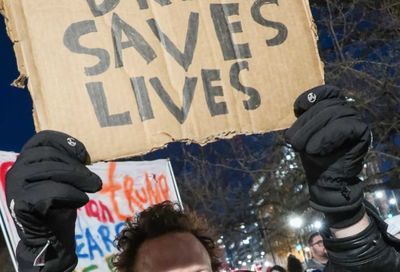Indonesia delays vote on new criminal code that could harm LGBTQ people
Critics say proposed changes' vague and overly broad language could effectively criminalize homosexuality

Indonesian President Joko Widodo has urged lawmakers to delay a scheduled vote on changes to the country’s criminal code that critics say would harm LGBTQ people.
Among the proposals contained in the revision are articles that penalize adultery, sex outside marriage, cohabitation, and the promotion of contraception.
From an LGBTQ context, because gay marriage is not recognized by the Muslim-majority country, any LGBTQ individual who engages in sexual activity could potentially be penalized for running afoul of these laws.
For example, the bill recommends a year-long prison sentence for any instance of extramarital sex, while the current code says only married couples can be prosecuted for sex outside of marriage, and only if their spouse or children file a complaint against them.
It also recommends a jail sentence of six months for cohabitation outside of marriage and for “obscene acts against another person of the opposite or same-sex,” reports The Washington Post.
For the past two decades, Indonesian lawmakers have been engrossed in the slow, complicated process of updating its Dutch colonial era law.
On Sept. 15, a parliamentary task force finalized a bill that included the controversial provisions, and political leaders promised a vote on Sept. 24.
But the proposed revisions have been met with fierce criticism, prompting Widodo to opine that the bill should not be voted on by members of the current House of Representatives, whose terms end in early October.
Instead, he argues, newly elected lawmakers should debate and vote on the law. He has also ordered Indonesia’s human rights minister to obtain input from various communities while working with lawmakers to amend some the bill’s more contested provisions.
“After learning the inputs from society, I concluded, there are some materials that needed further study,” he said. “I hope the House shares the same stance on this matter … that the passing of the criminal code bill into law should be postponed.”
Critics have argued that the proposed language is overly broad and not clearly defined, leading to fears that overzealous authorities may use the updated laws to target LGBTQ people for discrimination.
They note that, even under current law, police have raided LGBTQ meeting spaces and arrested individuals suspected of engaging in same-sex behavior. In West Java, police even set up a task force to spy on, arrest, and charge individuals suspected of promoting homosexuality.
Additionally, several provinces within the country, including Aceh province, already operate under Sharia law, which carries out punishments like public caning for those accused of engaging in homosexual behavior.

Human Rights Watch has advocated that the bill should be revised to meet international human rights standards.
“Indonesia’s draft criminal code is disastrous not only for women and religious and gender minorities, but for all Indonesians,” Andreas Harsono, a senior Indonesia researcher at Human Rights Watch, said in a statement. “Lawmakers should remove all the abusive articles before passing the law.”
“Experience from recent years has shown that existing national legislation, such as the Pornography Act and Public Nuisance laws, which do not refer explicitly to same-sex relations, have been used to target and imprison LGBTQ people,” Jessica Stern, the executive director of OutRight Action International, said in a statement. “The proposed changes to the Criminal Code will introduce a specific reference to same-sex acts, and, as such, will give authorities in Indonesia even more legal backing to persecute LGBTQ people.
“The move towards criminalization of consensual same-sex acts and increasing restrictions on sexual and reproductive health and rights in Indonesia is a frightening reminder of the the growing global backlash that we face in fighting for gender equality and the right of LGBTQ people to be who we are and love who we choose, without fear of violence, persecution or imprisonment,” Stern added. “This should serve as a reminder that progress cannot be taken for granted, and LGBTQ and women’s movements have to fight not only for progress, but also to safeguard that which has already been achieved.”
Read more:
Ben Carson allegedly called trans women “big, hairy men” during HUD meeting
Pete Buttigieg criticized LGBTQ media because he was “grumpy”
Queer Eye’s Jonathan Van Ness comes out as HIV-positive
Support Metro Weekly’s Journalism
These are challenging times for news organizations. And yet it’s crucial we stay active and provide vital resources and information to both our local readers and the world. So won’t you please take a moment and consider supporting Metro Weekly with a membership? For as little as $5 a month, you can help ensure Metro Weekly magazine and MetroWeekly.com remain free, viable resources as we provide the best, most diverse, culturally-resonant LGBTQ coverage in both the D.C. region and around the world. Memberships come with exclusive perks and discounts, your own personal digital delivery of each week’s magazine (and an archive), access to our Member's Lounge when it launches this fall, and exclusive members-only items like Metro Weekly Membership Mugs and Tote Bags! Check out all our membership levels here and please join us today!

























You must be logged in to post a comment.